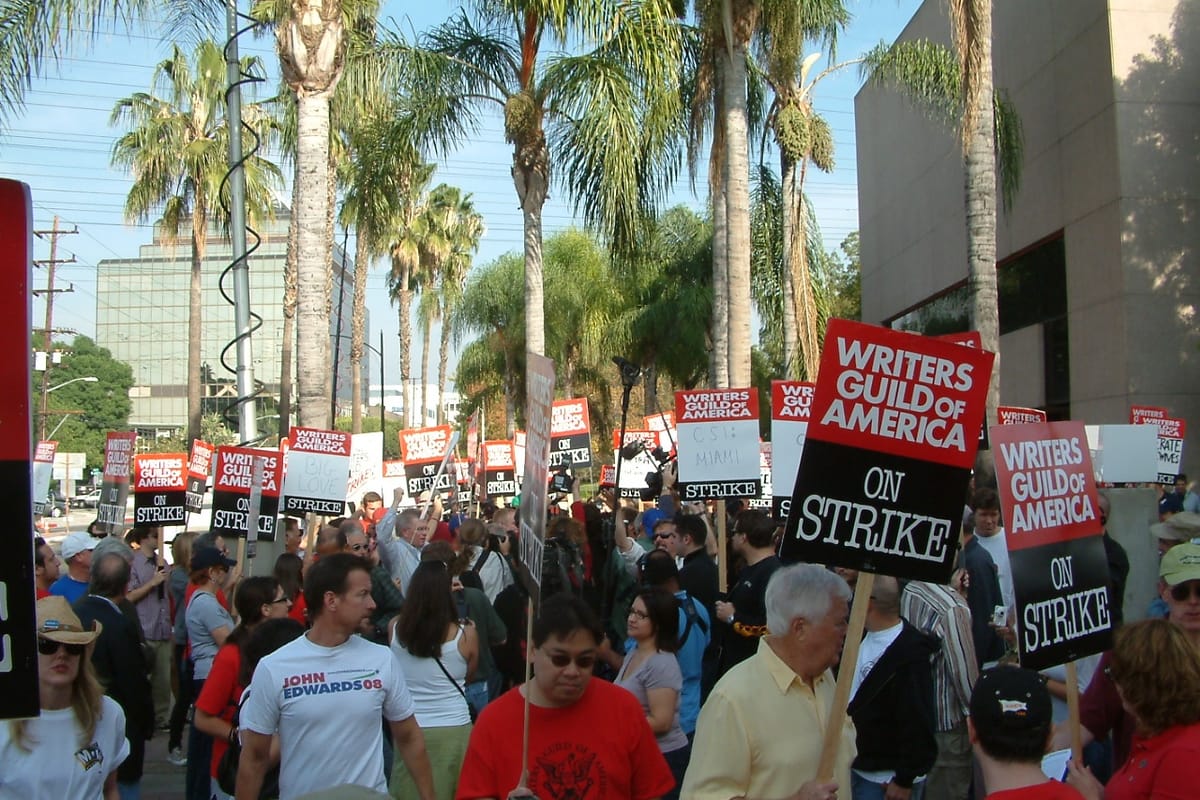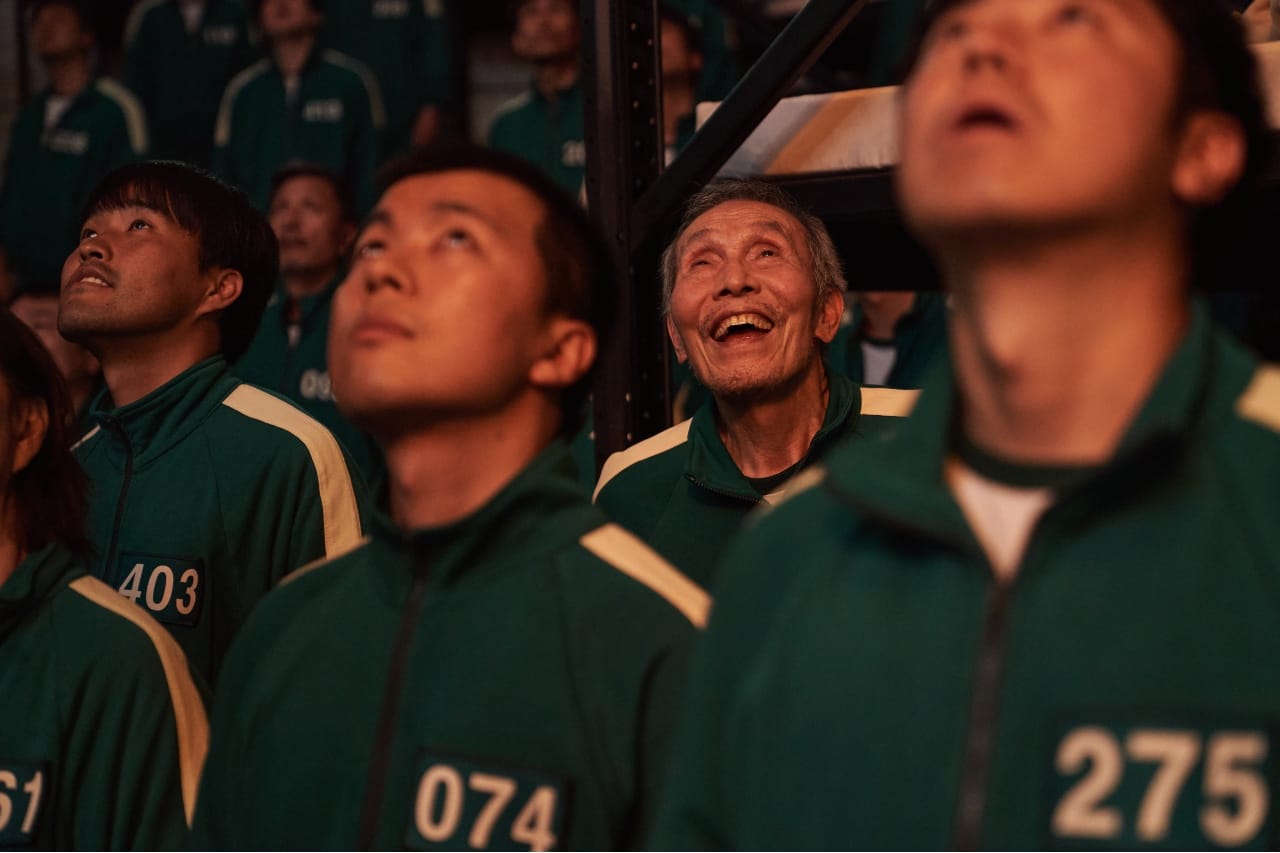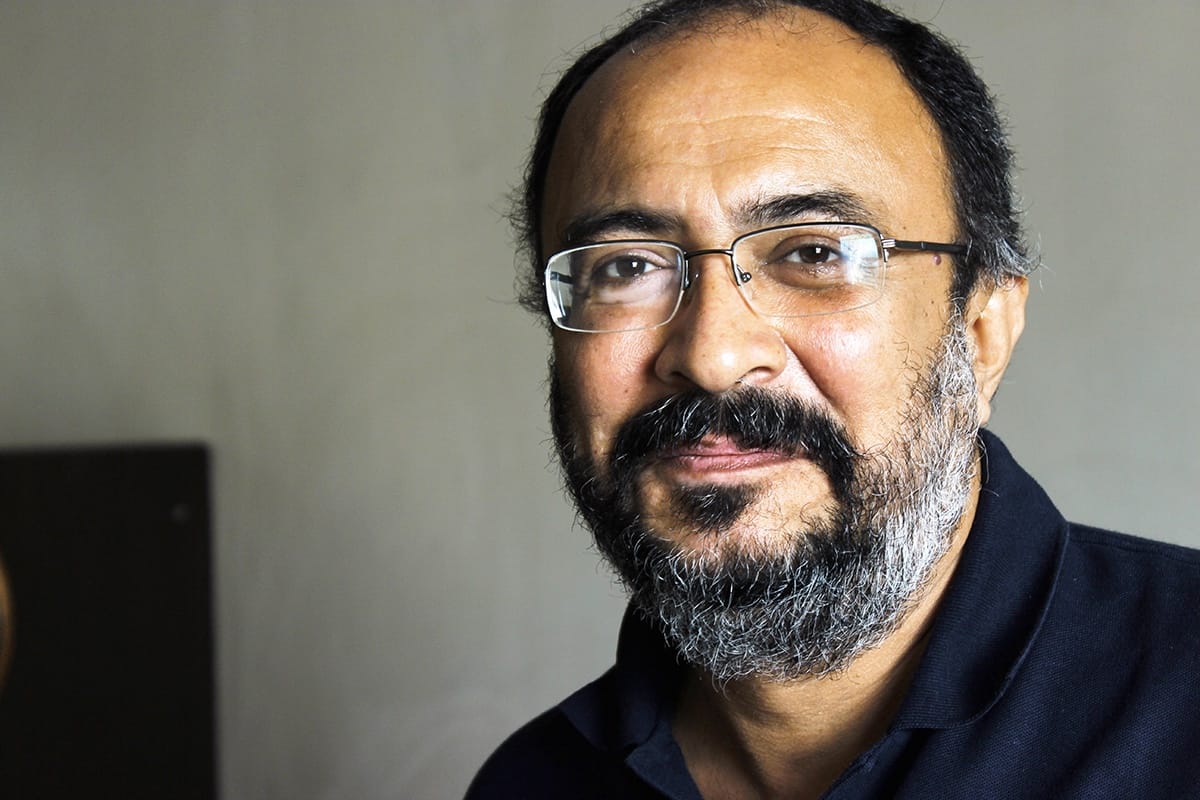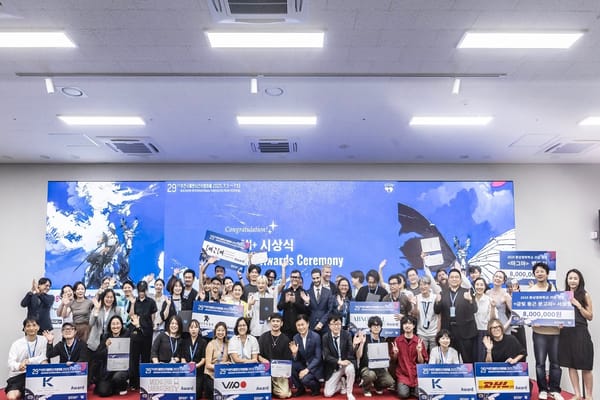How The US Writers Strike Might Impact International Territories

It’s been an interesting week with the Writers Guild of America (WGA) calling a strike of its members, just a few weeks before the world descends on Cannes to trade new independent film packages.
I won’t go into the reasons for the strike here as they’ve been well reported elsewhere, although to summarise, it’s connected to the way writers are paid in the streaming era, the rise of industry practices that remove guarantees on the level of regular employment, and the use of new technologies such as Artificial Intelligence (A.I.), which could replace writers’ work.
Currently, A.I. is not a huge threat to writers as Large Language Models (LLMs) can only produce routine, soulless versions of scripts, but the technology is advancing rapidly, and you can be sure the bean counters are already looking at ways it can be used to cut costs.
The strike is expected to last a minimum of three months and writers may soon be joined by directors and actors unless the Directors Guild of America (DGA) and the American Federation of Television and Radio Artists and Screen Actors Guild (SAG-AFTRA) reach new deals before the June 30 expiry of current agreements.
The WGA last called a strike in 2007 – it lasted 100 days into 2008 and resulted in US talent agencies being forced to give up their production activities, which were rightly called out as a conflict of interest. But the world was a very different place in 2007. Quite apart from the fact that streaming hadn’t upended revenue and distribution models, the gig economy had not yet been normalised and A.I. was still the stuff of science fiction.
This pushback probably wouldn’t have happened anywhere else in the world except the US’ highly-unionised film and TV industry. But it’s something that needs to happen pretty much everywhere. In every country I’ve been able to travel to since the end of Covid restrictions, I’ve heard writers, directors and independent producers express the same concerns.
The early days of the streaming boom, accelerated by the pandemic, may have looked like a bonanza for writers, directors and below-the-line crew. But it was only a matter of time before the conglomerates that dominate the global content industry in the streaming era started talking “cost correction” and squeezing talent.
Of course, the tech and content industries have been drifting into a highly monopolised form of digital feudalism for some time, and as these conglomerates operate globally, their actions impact the world.
I naively thought in the early days of the pandemic that it would give us breathing space to rethink some of the worst inequities of neoliberalism and capitalism, but now we’re on the other side of this worldwide crisis, can clearly see I was wrong. US writer and comedian Adam Conover summed up the current situation in an interview with CNN earlier this week:
“David Zaslav, the CEO of Warner Bros Discovery, the parent company of the network I’m talking to you on right now, was paid $250m last year, a quarter of a billion dollars. That’s about the same level as what 10,000 writers are asking him to pay all of us collectively. These companies are making enormous amounts of money. Their profits are going up. It’s ridiculous for them to plead poverty.”
Zaslav said on a Q1 earnings call yesterday that he expects Warner Bros Discovery’s streaming business to be profitable in 2023, one year ahead of schedule. So his bosses probably think he’s worth that $250m. Conover also mentioned Netflix co-CEO Ted Sarandos, who made $50.3m in 2022, a 32% increase from the previous year.
“When the writers who are making their shows, some of them are not able to pay their rent or mortgages – I know writers who have to go on assistance. If you look at these companies, they’re making more money than ever. The people who make the shows for them are making less,” Conover said.
But specifically, how does all this impact film and TV industries outside of the US? In the run-up to the strike, there was speculation that US studios and streamers would just outsource work to international territories to circumvent industrial action.
That looks increasingly unlikely as most major production territories have writers associations that are members of the International Affiliation of Writers Guilds (IAWG), in which all members have pledged to support each other in the event of a strike.
The past week has seen a slew of statements from guilds including the Writers Guild of Great Britain (WGGB), Australian Writers Guild (AWG) and India’s Screenwriters Association (SWA) asking their members to down tools on US projects.
It’s unlikely that a writer from outside the US could just be drafted in to work on existing projects, and keep the style and tone consistent, but this solidarity seems mostly aimed at preventing US companies from setting up new projects outside of WGA jurisdiction.
What is more likely is that US broadcasters and streamers will dig into existing libraries, broadcast re-runs, or ramp up acquisitions to keep the content pipeline flowing. This could be an advantage for content producers outside of the US, including those producing content in languages other than English.
So far, the local subsidiaries of the global streamers have not been included in calls for work stoppages, and the success of shows such as Money Heist and Squid Game show that US audiences have become less resistant to non English-language content.

But this potential greater reliance on the overseas production divisions of US streamers raises another interesting issue. The flood of investment from US streamers into local-language content (especially in Korea, India, some Latin American and European territories) has always been presented as a huge opportunity for local production industries.
In developing markets, it’s also been an opportunity for US companies to make content much more cheaply and outside of any kind of trade union protection for creatives and crew. Datta Dave, co-founder of Indian talent agency Tulsea, commented on this in a profile I wrote for Deadline this week:
“We’ve also overlooked the whole issue of Hollywood entities treating writers a certain way in the United States, then using this excuse of local market practices to benefit from cost arbitrage,” says Dave. “Of course, the fact that streamers can make programming more cheaply in growth markets is not necessarily a bad thing – it also helps the local market – but the lack of unions also enables them to avoid offering many of the other standard clauses and benefits that a WGA writer would get.”
Of course, there are plenty of companies making content in these territories that are not subsidiaries of global streamers, and they could potentially benefit from Hollywood strikes by selling more content to US buyers. But most of these films and series are made for local audiences, so have local sensibilities, and it’s unlikely that production companies in India, China and Japan would suddenly pivot to making content that appeals to US audiences. If however, there is going to be a business opportunity, we may see the first stirrings in Cannes.
We’re also seeing the first murmurings of defiance from writers in production communities outside of the US who are asking why they should support the WGA when they don’t enjoy the same level of pay and benefits as their American brethren. It’s not just about the money, there are other issues such as credit disputes, arbitrary termination, copyright, indemnities and royalties that are not covered by standard contracts in many international territories.
These grumblings are happening even in mature markets like the UK, indeed are more likely to emerge in wealthier, English-speaking industries, as these are the ones where writers are most likely to be losing out on work for US projects.
It's understandable that a writer struggling to pay their rent in Andheri, Kodambakkam or even London (can writers still afford to live in London?) might not feel a huge amount of solidarity with a writer sitting in Santa Monica. But it’s precisely these disparities in working practices, in an increasingly globalised industry, that should be encouraging a push towards global values.
India’s SWA, which is currently in the process of drafting its own version of a Minimum Basic Agreement, explained this to their members this week. After expressing solidarity with the WGA, the association stated:
“If the WGA strike succeeds, it helps our efforts, by setting a precedent. After all, we shall be negotiating with the Indian subsidiaries of some of those companies.”
India does not have a unified body like Hollywood’s Association of Motion Picture and Television Producers (AMPTP) to negotiate with, so is holding talks with major producers individually, which will be a lengthy process. (The Producers Guild of India is more of a lobbying body representing the industry in talks with the government).
“An individual writer has a very tough time negotiating with these multinational platforms, as their power and financial resources are huge,” explains SWA executive council member Anjum Rajabali. “So collective bargaining becomes extremely important to protect those writers.”

And this is just the situation in India. How are writers being treated in Korea, Japan, China, Egypt, Nigeria and Indonesia? Rather than asking ‘what has the WGA ever done for us?’ perhaps we could be looking at what we can learn from what they’ve done in the US and develop systems of collective bargaining in other territories.
Perhaps the IAWG could work towards a Minimum Basic Agreement that could be adopted globally. Minimums and residuals may differ to take into account the cost of living in different parts of the world, but the basic principles that protect writers and other creatives could become a global standard.
At the very least, the WGA strike could start a worldwide conversation about how creatives are compensated and the contractual rights that they should be able to take for granted. These issues are not going to go away as corporate behemoths battle it out to grab their share of the global streaming market and technology advances at a dizzying rate. It’s now or never for creatives around the world, and the organisations that represent them, to stand up and fight for their rights.
THIS FORTNIGHT IN THE TRADES:
LAB & FUNDING NEWS:
Turkey and Korea titles win 2023 Jeonju Project awards
PRODUCTION NEWS:
India’s IN10 Media Network Launches MovieVerse Studios, Reveals Diverse Slate
Aryan Khan, Son Of Shah Rukh Khan, Set To Make Directorial Debut With Red Chillies Series
Japanese Location Production Operation Launched by Toho, Country’s Major Film Group
Nigerian Media Mogul Mo Abudu Launches New Cinema Label, Directs First Short Films
UCP Partners With Nigerian Company to Make Comic Book TV Shows (Exclusive)
Chen Kaige Sets ‘Swan Song’ Tchaikovsky Epic as Next Directorial Project
CORPORATE:
Warner Bros Discovery, Viacom18 Sign Exclusive Content Partnership For India
CANCELLED:
Jafar Panahi Reported To Have Left Iran For First Time In 14 Years
CANNES MARKET:
Saudi Arabia’s Red Sea film festival teams with Cannes market on rising talent platform
CURATED:
‘There Is A Stone’, ‘From You’ win top prizes at Jeonju film festival
Carlota Pereda ‘The Chapel,’ Syeyoung Park’s ‘The Fin’ among Cannes’ Fantastic 7 line-up
RELEASED:
Shah Rukh Khan’s ‘Pathaan’ to Receive Bangladesh Theatrical Release
SIGNED:
‘Drive My Car’ Star Hidetoshi Nishijima Signs With CAA (EXCLUSIVE)
Tunisian Actress Hend Sabry, Star Of Upcoming Cannes Contender ‘Four Daughters’, Signs With CAA
SOLD:
Yellow Veil Pictures & Drafthouse Co-Acquire U.S. Rights For ‘Once Upon A Time In Uganda’
Gkids Acquires Toei Animation Title ‘The First Slam Dunk’ Based On Takehiko Inoue Manga
Tiger Pictures Acquires International Rights To Chinese Hit Comedy ‘Godspeed’
STREAMING UPDATES:
‘The Night Manager India’ Gets Second Part On Disney+ Hotstar
Netflix Confirms Plans To Spend $2.5BN On Korean Content Over Four Years




